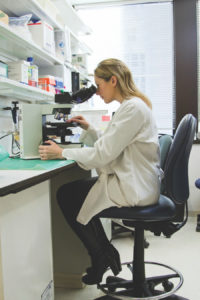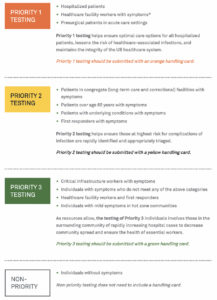PROVINCETOWN — The goal is clear and workable: at some point, we’ll be able to systematically screen for coronavirus, identify asymptomatic carriers early, and effectively squelch community spread.
What we once achieved through lockdowns, we would then be able to maintain through intensive testing and contact tracing. Screening programs are the bridge to get us from a post-lockdown world to a vaccinated one. They have been successful in other countries.
Here in the Northeast, where case numbers have remained low since the end of May, this goal is still within reach.
Still, obstacles remain. Testing is expensive — and testing in large numbers is very expensive. Finding the money is an issue.
Additionally, there’s a nationwide surge in testing that’s overwhelming laboratory capacity and threatening to make supplies scarce. The turnaround time for test results has been getting longer — it’s currently around eight days, according to Dr. John Cornwell, a medical director at CareWell Urgent Care clinics.
A lot of interaction and virus spread can happen in eight days, particularly for people who aren’t showing symptoms. Getting that turnaround time shorter is another key problem that state and local officials are working to solve.
Who Pays for Screening?
The Outer Cape’s first experience with an asymptomatic screening program was on June 17 and 18, when the state’s dept. of public health organized two days of free testing, open to anyone, at 50 locations statewide. There were 2,188 tests performed at the Provincetown, Wellfleet, and Harwich clinics of Outer Cape Health Services, according to OCHS communications officer Gerry Desautels. The state paid $144.27 per test — $100 to the lab, Quest Diagnostics, and $44.27 to OCHS for collecting the samples. At that rate, the two days of testing at these three sites cost the state $315,000.
On July 22, Provincetown conducted its first homegrown asymptomatic testing effort, organized by the town’s health dept. in conjunction with local employers. Employers in the hospitality industry are paying half the cost of a test for their frontline public-facing employees, or $75, while the town picks up the other $75. As part of this program, 136 people were tested, with the town and employers each putting up around $10,000.
“We’re working to set up a more regular asymptomatic testing capacity for a variety of workers,” said Provincetown’s health director, Morgan Clark. The health dept. started with hotel, restaurant, and retail employees, because they were most directly exposed to travelers during July 4th weekend, said Steve Katsurinis, chair of the Provincetown Board of Health.
 Nantucket has already launched an asymptomatic screening program in which high-contact individuals are invited to get a test by the health dept. The select board of Nantucket has allocated up to $100,000 for these tests.
Nantucket has already launched an asymptomatic screening program in which high-contact individuals are invited to get a test by the health dept. The select board of Nantucket has allocated up to $100,000 for these tests.
The largest and oldest asymptomatic testing program in the region is on Martha’s Vineyard. Since late May, more than 6,000 tests of asymptomatic people have been conducted through the public-private partnership TestMV. That’s in addition to 2,600 tests of symptomatic or contact-traced people conducted at Martha’s Vineyard Hospital.
At the industry standard of $150 per test, 6,000 asymptomatic tests would cost $900,000.
What About Insurance?
State Rep. Sarah Peake is trying to get an amendment through the Mass. House that would require insurance companies to pay for asymptomatic screening tests for people working in high-contact fields, she said on Monday.
“Housekeepers, people who work in restaurants, grocery store workers, EMS, police,” Peake said. “[State Sen. Julian Cyr] and I have had lengthy conversations about this. Especially in our area, where there’s been an influx of people, the need for this has become very clear.” Insurance companies are better able to pay than individual businesses or towns, she added.
Having insurance pay could allow screening efforts to be scaled up dramatically. That would only increase pressure on the wait for results.
Many Reasons to Test
A surge of testing related to the massive coronavirus outbreaks in the southern and western United States has overwhelmed laboratories, including Quest Diagnostics, said Sean O’Brien, emergency preparedness coordinator for Barnstable County.
“We are definitely looking to other laboratories to try to diversify, since Quest is so backlogged,” said Cyr. “The Broad Institute is a network of research labs in Boston — at the statewide level, they’re helping a lot. Cape Cod Hospital has a really great piece of equipment that can turn out results in four hours — but they have to reserve its capacity for their incoming patients, and there’s also a worry about running out of the supplies that are unique to that machine,” Cyr added.
Barnstable County is coordinating a mobile testing effort that can access Cape Cod Hospital’s super-fast machine.
“So, because of that big house party in Chatham [on July 12] where we know a lot of people were exposed, we are sending out the mobile test clinic, and those 50 tests will be collected today and processed very quickly,” said O’Brien. “If it were something smaller, a cluster of four or five, we probably would use a different lab, but with something that significant Cape Cod Healthcare was happy to help.”

Quest also has a tiered processing system, with some people getting results faster than others. Health-care workers with symptoms are in the most expedited tier. People with symptoms who are over 65 or have underlying health conditions are in the next tier. The third tier contains ordinary people with symptoms and some first responders, and the fourth tier is everyone else — including those contacted by a tracer.
It makes sense that more vulnerable people get their results first. But for people who are contact traced and don’t feel sick, it means staying home and away from work for up to eight days while waiting for test results to come in. With an eight-day wait, the screening program is alerting us to dangerous spread after it happens, not before.
And the number tests needed is bound to grow. Many schools and universities are planning to require a negative Covid test to be on campus. The governor’s new mandatory quarantine rules require a negative test result, from a sample taken less than 72 hours prior to travel, from travelers from 42 states entering Massachusetts. If your results are delayed, you must quarantine upon arrival until those results clear you. The fines for breaking these new rules are $500 a day.
If students and travelers need to be cleared by a lab test, then the backlog may get worse.
“We can’t manage a pandemic waiting eight days for test results,” said Peake. “This has to be improved.”



